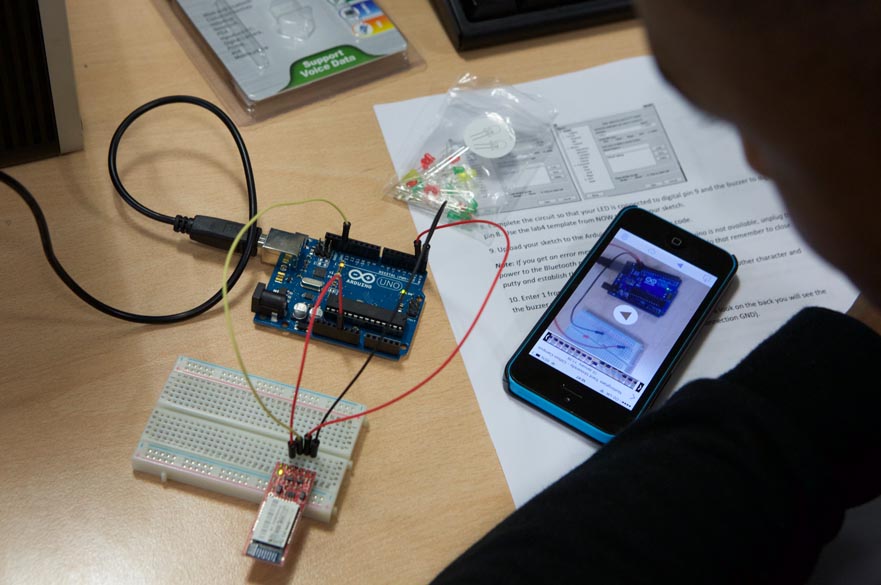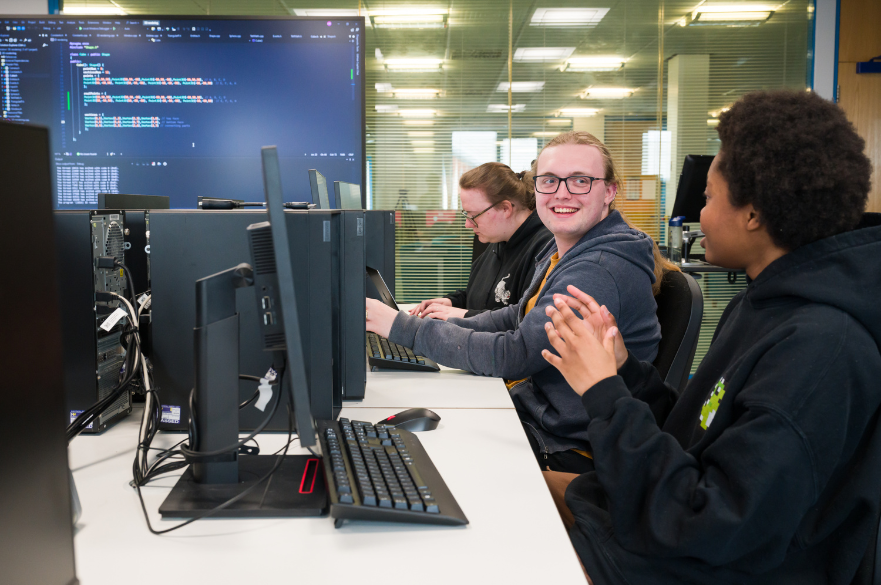Software Engineering MSc
About this course
This Software Engineering postgraduate degree will give you experience in the analysis, design and development of computing systems solutions relevant to a wide range of applications in industry and business. You will be able to devise multi-tasking software solutions using high-level languages to implement suitable architecture-software constraints for computer applications. You will develop project management skills that will allow you to effectively contribute to the creation and management of large computing projects and to appreciate the techniques employed in managing such projects.
If you're looking to work in computing and technology industries, this is a great fast-track conversion course for graduates from disciplines unrelated to IT and computing.
We have a rich mix of knowledge for you to learn from, ranging from software application development for different types of systems, to project management techniques for software development teams.
We engage fully in our subject area and this engagement feeds directly and indirectly into our teaching. Professor David Brown leads several projects in games and assistive technology while Professor Paul Evans' innovative developments in security are supported by the USA Dept of Homeland Security.
Other examples of our activity are:
- developing patents (for example, in voice signal processing)
- involvement in the GameCity Festival
- organising conferences on Interactive Technology and Games and on Intelligent Environments
- working with local companies on funded projects e.g. enhancing the capability of the press association to search their image database
- publishing novel findings in research publications on for example financial prediction, mobile communications, and detection of human behaviour patterns.
What you’ll study
Throughout the course, you will acquire knowledge of computer technology, architecture and communications as a means to developing computer-based systems in industrial environments. The course offers an excellent combination of theoretical studies and practical experience through coursework assignments, software development and group projects culminating in a significant and practical Masters project individually tailored to meet your career aspirations.
Fundamentals of Software Programming (20 credit points)
This module will develop your programming skills using a high-level language, and develop your understanding of software-implementation principles.
Systems Analysis and Design (20 cp)
Understand the life cycle software process. The module introduces a number of Systems Development (SD) methodologies and associated techniques: Real Time Analysis and Design (RTAD), Data Modelling (DM) and Usability Engineering (UE).
Mobile Interactive Systems (20 cp)
Examine the key issues in the implementation of interactive mobile applications, and gain an appreciation of the platform design guidelines, capabilities and constraints of a variety of mobile computing technologies and applications.
Software Design and Development (20 cp)
Your skills will be developed to an advanced level where you can demonstrate expertise in the design of software, showing analytical judgement in the selection and use of advanced software development tools and techniques.
Research Methods (20 cp)
You will develop the skills of research and enquiry that will enhance your independent learning abilities and enable you to write effective project reports and technical papers.
Software Project Management (20 cp)
This module will give you the knowledge, practice and skills to successfully initiate, plan, manage, control and report on software development projects. You will begin learning about Project Management Frameworks, which covers stakeholders, tools and techniques before considering aspects such as predictive lifecycles, adaptive development and integration.
Major Project (60 cp)
On completion of the taught modules on this course you will then have the opportunity to undertake an MSc topic. This gives you 15 weeks to concentrate full time on a specialist area that interests you and apply what you have learnt to a specific problem.
We regularly review and update our course content based on student and employer feedback, ensuring that all of our courses remain current and relevant. This may result in changes to module content or module availability in future years.
How you're taught
You will learn through:
- Lectures
- Guided reading supported by the University's virtual learning portal
- Workshops and laboratories
- Seminars
- Case studies and project work.
Research informed teaching
By daring to think differently our research is tackling real-world issues. The subjects you will study with us are informed by our research so you can be sure your knowledge will be cutting-edge in your field. In the last Research Excellence Framework (REF 2021) - the UK's system for assessing the quality and impact of research in universities - we’re proud that 80% of NTU's Computer Science and Informatics submission was assessed to be either world-leading or internationally excellent.
Learn a new language
Alongside your study you also have the opportunity to learn a new language. The University Language Programme (ULP) is available to all students and gives you the option of learning a totally new language or improving the skills you already have. Find out more about the ULP.
How you're assessed
You will be assessed by a variety of methods including:
- Research project
- Written assignments
- Case studies
- Oral presentations
- Coursework reports
- Written exam
Contact hours
Lectures / seminars / workshops (20%) and independent study (80%)
Careers and employability
The industry-focused nature of this Software Engineering Masters course will ensure that you stand out from the crowd when it comes to job applications and pursuing your future career.
Nottingham Trent University graduates are widely respected amongst employers and our Science and Technology students are perceived as having the competitive edge due to the hands-on approach of our teaching.
This course provides the software engineering knowledge and programming skills necessary for a broad range of careers in the industrial and business sectors, and the transferable ICT skills to go with them. This means that you will be highly sought after by employers such as Siemens Communications, or for IT positions within the finance and banking sector, for example.
Placement opportunities
NTU is one of the most employment-focused universities. Increasingly, employers want to recruit graduates who have real-world work experience. That’s why all of our courses, across every subject area, offer you a work experience opportunity. Our experts help build and support your future with a range of career programmes and events.
The school of Science and Technology will work closely with you to help find a placement and strengthen your CV and interview techniques. You'll be supported and assessed throughout your placement year and will write a reflective report and diary at the end of your placement. When you successfully complete your placement and submit your placement report, you will be eligible to receive an additional award of a Postgraduate Diploma in Professional Practice.
Please note that placements are not guaranteed and the process is competitive through an application and interview process.
If you take the sandwich route, you will take a one-year work placement after the first three terms before returning to NTU the following year to start your research project.
Our recent students have taken placements across a wide range of companies including Prism UK, Gedling Borough Council and ENSEK. They secured varied roles such as Systems Integration Engineer, Cloud Operations Engineer and Software Engineer.
Re:search Re:imagined
To us, research is about more than writing papers and proposing new ideas. By daring to think differently, we’re disrupting the research landscape and finding the answers to the questions that really matter. From conservation management to sustainable farming, we’re inspiring the brightest minds to rise up and find solutions to some of the most significant global challenges facing society.
NTU Enterprise
You'll also have the opportunity to turn your ideas into a viable business with help from NTU Enterprise, NTU's purpose-built Centre for Entrepreneurship and Enterprise, a support centre to help students create, develop and grow their own businesses.
Campus and facilities
You’ll mainly be studying in the Interdisciplinary Science and Technology Centre (ISTeC) with access to facilities including a Games Development Lab Robotics lab and a High Performance Computing Suite.
Our self-contained, community-focused Clifton Campus has been designed to keep students busy between lectures. Catch-up with your course mates in the Pavilion’s barista café and Refectory; brainstorm group presentations in chic and stylish study spaces; enjoy some proper R&R in The Point, home of our Students’ Union. The campus also hosts the multimillion-pound Clifton Sports Hub, offering great options for everyone — whatever your interests, and however competitive you’d like to get!
You’re also right next to the bright lights of Nottingham — one of Britain’s top 10 student cities, and one of Europe’s top 25. All through termtime, a dedicated on-campus bus service will get you to the heart of the action (and back) in under 25 minutes. You’ll find a city stuffed with history, culture, and well-kept secrets to discover at your leisure: enjoy lush green spaces, galleries, hidden cinemas and vintage shopping by day, and an acclaimed food, drink and social scene by night.
Entry requirements
UK students
Academic entry requirements: 2.2 honours degree or equivalent in a technical or scientific subject, which includes, but is not limited to, sport science, biomedical, economics, information systems and multimedia.
Applicants with relevant employment experience or other relevant qualifications will also be considered.
Additional requirements for UK students
There are no additional requirements for this course.
Other qualifications and experience
We welcome applications from students with non-standard qualifications and learning backgrounds and work experience. We consider credit transfer, vocational and professional qualifications, and any work or life experience you may have.
You can view our Recognition of Prior Learning and Credit Transfer Policy which outlines the process and options available, such as recognising experiential learning and credit transfer.
Getting in touch
If you need more help or information, get in touch through our enquiry form.
International students
Academic entry requirements: 2.2 honours degree or equivalent in a technical or scientific subject, which includes, but is not limited to, sport science, biomedical, economics, information systems and multimedia.
Applicants with relevant employment experience or other relevant qualifications will also be considered.
We accept equivalent qualifications from all over the world. Please check your international entry requirements by country.
English language requirements: See our English language requirements page for requirements for your subject and information on alternative tests and Pre-sessional English.
Additional requirements for international students
If you need help achieving the academic entry requirements, we offer a Pre-Masters course for this degree. The course is offered through our partner Nottingham Trent International College (NTIC) based on our City Campus.
English language requirements
View our English language requirements for all courses, including alternative English language tests and country qualifications accepted by the University.
If you need help achieving the language requirements, we offer a Pre-Sessional English for Academic Purposes course on our City campus which is an intensive preparation course for academic study at NTU.
Other qualifications and experience
We welcome applications from students with non-standard qualifications and learning backgrounds and work experience. We consider credit transfer, vocational and professional qualifications, and any work or life experience you may have.
You can view our Recognition of Prior Learning and Credit Transfer Policy which outlines the process and options available, such as recognising experiential learning and credit transfer.
Sign up for emails
Sign up to receive regular emails from the International Office. You'll hear about our news, scholarships and any upcoming events in your country with our expert regional teams.
Getting in touch
If you need advice about studying at NTU as an international student or how to apply, our international webpages are a great place to start. If you have any questions about your study options, your international qualifications, experience, grades or other results, please get in touch through our enquiry form. Our international teams are highly experienced in answering queries from students all over the world.
Policies
We strive to make our admissions procedures as fair and clear as possible. To find out more about how we make offers, visit our admissions policies page.











